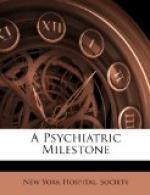The mind and soul of man have indeed had a hard time. To this day, investigators have suffered under the dogma that mind must be treated as purely subjective entity, something that can be studied only by introspection, or at least only with ultra-accurate instruments—always with the idea that common sense is all wrong in its psychology. Undoubtedly it was, so long as it spoke of a mind and soul as if what was called so had to be, even during life, mysterious and inaccessible, something quite different from any other fact of natural-history study.
The great step was taken when all of life was seen again in its broad relations, without any special theory but frankly as common sense finds it, viz., as the activities and behavior of definite individuals—very much as Aristotle had put it—“living organisms in their ‘form’ or activity and behavior.” Psychology had to wake up to studying other minds as well as one’s own. Common sense has always been willing to study other persons besides our own selves, and that exactly as we study single organs—viz., for what they are and do and for the conditions of success and failure. Nor do we have to start necessarily from so-called elements. Progress cannot be made merely out of details. It will not do merely to pile up fragments and to expect the aggregates to form themselves. It also takes a friend of facts with the capacity for mustering and unifying them, as the general musters his army. Biology had to have evolutionists and its Darwin to get on a broad basis to start with, and human biology, the life of man, similarly had to be conceived in a new spirit, with a clear recognition of the opportunities for the study of detail about the brain and about the conditions for its working and its proper support, but also with a clear vision of the whole man and all that his happiness and efficiency depend upon.
All this evolution is strongly reflected in the actual work of psychiatry and medicine. For a time, it looked to the physician as if the physiology and pathology of the body had to make it their ambition to make wholly unnecessary what traditional psychology had accumulated, by turning it all into brain physiology. The “psychological” facts involved were undoubtedly more difficult to control, so much so that one tried to cut them out altogether. As if foreshadowing the later academic “psychology without soul and consciousness,” the venerable Superintendent of Utica, Dr. Gray, was very proud when in 1870 he had eliminated the “mental and moral causes” from his statistics of the Utica State Hospital, hiding behind the dogma that “mind cannot become diseased, but only the body.” To-day “mental and moral causes” are recognized again in truer form—no longer as mere ideas and uninvestigated suppositions taken from uncritical histories, but as concrete and critically studied life situations and life factors and life problems. Our patients are not sick merely in an abstract mind, but by actually living in ways which put their mind and the entire organism and its activity in jeopardy, and we are now free to see how this happens—since we study the biography and life history, the resources of adaptation and of shaping the life to success or to failure.




